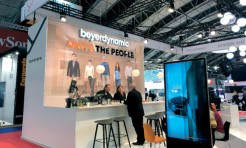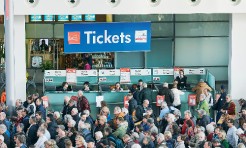Trade fair logistics: When importing is difficult
Two partners united by the International Exhibition Logistics Association (IELA) know how to deal with difficult markets. Including Russia and Africa.

Christoph Rauch and Elizabeth Niehaus were featured in the lecture programme of Euroshop 2020 last February. Under the motto “No Exhibit, No Show” they presented new IELA solutions and ways out of customs difficulties with trade show imports. The IELA board member and IELA executive officer discussed emerging countries and particularly difficult markets. The subjects they addressed included the challenge of delays due to lacking capacities or increasing bureaucracy as well as how exhibition and events logistics companies can meet special requirements for stand designers and exhibitors. And, of course, they discussed the impacts of digitisation on how exhibits and stands finally reach the venue.

Christoph Rauch presented two case studies on Russia and Africa. He highlighted, for example, that customs procedures are taken very seriously in Russia. High fines and taxes are enforced for not abiding by the rules. Rauch believes that the word “complex” is an understatement when it comes to sending exhibition cargo to Russia. It is a notoriously difficult procedure and often a costly undertaking. As an example, he cited the importation of a stand designer’s tool kit for temporary purposes. He claims that one cannot simply declare the kit as “one toolbox” or at least as several groups made of similar items. Every single tool must be listed separately, citing the name of the tool manufacturer, type designation and serial number.
In addition to this, the country has unique intellectual property protection laws, as Christoph Rauch explains. This necessitates special import permits from manufacturers and copyright owners. The managing director of the logistics company BTG, based in Langweid near Augsburg, again brought up the example of the stand designer’s tool kit. The stand designer’s customs broker needs to obtain an import permit - e.g. from Bosch, in order to conduct customs clearance, say, of the stand designer’s electric screwdriver in the tool kit. This fictitious case shows that many trade fair transports with supporting documents are doomed to fail despite the best of intentions. The almost “religious fervour” of the Russian customs authorities is maybe explained by the fact that around 30 per cent of Russia’s federal budget stems directly from import customs duties and taxes. Plus: Although the Russian customs code should be applied consistently, different customs offices use different interpretations.

According to Rauch, exhibition logistics in Africa involves a huge bureaucracy within all government bodies in many countries. When working with customs brokers in African countries it is best to try and work with someone one has had some kind of previous dealings with. Or somebody who has been referred to one’s company. Working with an unknown broker can lead to problems. Delaying tactics are frequently used to extort money. Many of the problems at border crossings can be alleviated by making use of an IELA member. The lecture by Christoph Rauch and Elizabeth Niehaus concluded with a presentation of the new IELA organiser & exhibitor portals. There you can find tips and tricks from experienced freight forwarders with hands-on solutions, as well as advice to help prepare the transit of goods across borders. (www.iela.org).
Author: Peter Borstel
This article was published in TFI issue 2/2020
Share in Facebook, Twitter or Google+:
TFI - Trade Fairs International - The International Trade Fair Magazine.
© 2006 - 2024 by TFI-Verlagsgesellschaft mbH. All rights reserved. TFI-Verlagsgesellschaft mbH shall accept no responsibility for the contents of external links and other contents.
TFI-Know-how
-
What to do when things go wrong at virtual or in-person events?

In the event world, it’s simply part of life if things don’t work out as planned.
-
How can networking be made to work at online events?

Networking typically happens at real, in-person events. But it’s also possible to do it online; it just works a little differently. There are various options available to organisers.
-
How can exhibitors stand out at trade fairs?

New products and a well-conceived stand design are not the only drivers for a successful presence. Many other factors are also important, but trade fair planners often lose sight of them.
-
How can industry decision-makers be reached online?

Trade fairs and trade fair companies need to constantly further develop, become more agile and flexible and offer services all year round. New, digital offerings are very important here. With its TrustedTargeting technology, Messe München offers its customers access to leading business-to-business decision-makers on the Internet.


